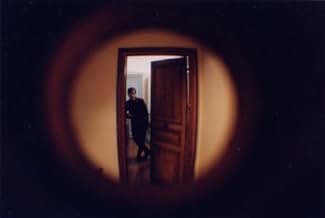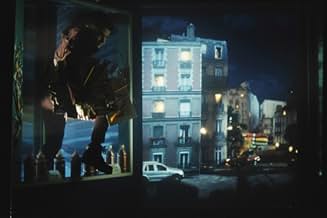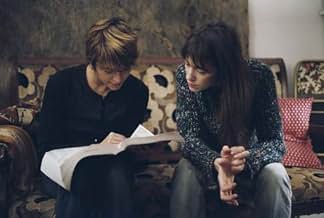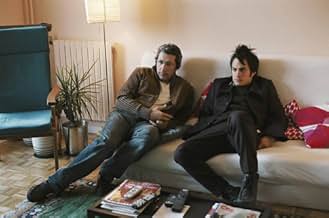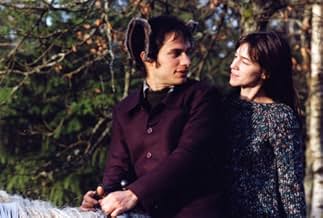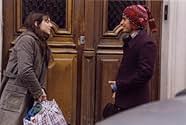A man entranced by his dreams and imagination is love-struck with a French woman and feels he can show her his world.A man entranced by his dreams and imagination is love-struck with a French woman and feels he can show her his world.A man entranced by his dreams and imagination is love-struck with a French woman and feels he can show her his world.
- Awards
- 7 wins & 9 nominations total
Alain de Moyencourt
- Gérard
- (as Decourt Moyen)
- Director
- Writer
- All cast & crew
- Production, box office & more at IMDbPro
Featured reviews
Director Michel Gondry continues his exploration of the world of dreams, this time without the master writing of Charlie Kaufman who authored the script of 'Eternal Sunshine of the Spotless Mind'. Taking upon himself the writing of the story and setting it in an every day Parisian setting Gondry succeeds quite well to continue on the same line of dreams taking over the real world. Here he brings to screen a very direct and simple love story between two young people living half in reality, half in the world of dreams of the principal character. Stephane (Gael García Bernal) is a Mexican young fellow visiting his mother and trying to accommodate with a boring job. He is less living in the real world and more in a world of fantasy where he is trying to find place for his neighbor Stephanie (Charlotte Gainsbourg) he falls for.
The very simple and direct story has an overall air of freshness, resulting from acting, but especially from the very warm and almost childish approach to the world of dreams put together by Gondry. His surrealistic space has nothing threatening, no shades or sharp lines as in Dali or De Chirico's paintings no hidden threats as in Hitchcock or social pressure as in Bunuel's movies. It is rather the world of childish cartoons, a low-tech and benevolent space of a prolonged childhood. If we are to trace the roots I would rather go back to the innocence of the characters in Boris Vian's 'L'Ecume des Jours.
I do not know if Gondry will continue his exploration of the world of dreams in future films, but with the two movies in this thematic space he already left a print of his own in a different type of cinema I would call cinema of dreams. From several points of view, because of the sincerity and freshness of the narration I liked more 'La Science des Reves' than the stars-stricken 'Eternal Sunshine of the Spotless Mind'.
The very simple and direct story has an overall air of freshness, resulting from acting, but especially from the very warm and almost childish approach to the world of dreams put together by Gondry. His surrealistic space has nothing threatening, no shades or sharp lines as in Dali or De Chirico's paintings no hidden threats as in Hitchcock or social pressure as in Bunuel's movies. It is rather the world of childish cartoons, a low-tech and benevolent space of a prolonged childhood. If we are to trace the roots I would rather go back to the innocence of the characters in Boris Vian's 'L'Ecume des Jours.
I do not know if Gondry will continue his exploration of the world of dreams in future films, but with the two movies in this thematic space he already left a print of his own in a different type of cinema I would call cinema of dreams. From several points of view, because of the sincerity and freshness of the narration I liked more 'La Science des Reves' than the stars-stricken 'Eternal Sunshine of the Spotless Mind'.
This movie had a lot going for it. The art direction was incredibly fun and creative, and overall the movie looked great and had a very unique vision. It was cute and quirky and definitely made me laugh out loud at times while at other times it made me feel awkward and tense in the best possible way.
The dream sequences were fun and blended with reality in a very seamless and engaging way (though on a personal level I prefer the way dreams were portrayed in Waking Life). And while on the surface the love story was thoughtful and true (and I could even relate to it in some ways), the problem for me was that I just couldn't sympathize with Bernal's character, Stéphane. I couldn't really see where Gainsbourg's character, Stéphanie, was coming from either. While their interaction was at times endearing, I just didn't feel like I had to root for them. Still though, there was enough charm in this movie that that fact didn't ruin the movie for me.
The dream sequences were fun and blended with reality in a very seamless and engaging way (though on a personal level I prefer the way dreams were portrayed in Waking Life). And while on the surface the love story was thoughtful and true (and I could even relate to it in some ways), the problem for me was that I just couldn't sympathize with Bernal's character, Stéphane. I couldn't really see where Gainsbourg's character, Stéphanie, was coming from either. While their interaction was at times endearing, I just didn't feel like I had to root for them. Still though, there was enough charm in this movie that that fact didn't ruin the movie for me.
Or, The Science of Sleep. A film that rates -very- high on the weirdness scale as it tells the story of a man that has trouble keeping reality and dreamworld apart. It starts when he moves back to France to live with his mother after his father passes away. The rest of his story is a fairly normal one, just the way it is played out is rather odd.
This film had me watching it open mouthed for most of the time. From the very start of it to the very end. In fact, I might have had my mouth open from the moment it started - I didn't realize it until about halfway through. The astonishment and pleasure on my end started with the very first shots - the way things got depicted and worked out. A film that is as much a film as a true piece of art.
I can do nothing other than rating this one very highly. It is like a dream but also like reality and it explains its title and theme very clearly. Acting is good enough and the music choice is very fitting. All in all, very worthwhile material.
9 out of 10 fuzzy dreams
This film had me watching it open mouthed for most of the time. From the very start of it to the very end. In fact, I might have had my mouth open from the moment it started - I didn't realize it until about halfway through. The astonishment and pleasure on my end started with the very first shots - the way things got depicted and worked out. A film that is as much a film as a true piece of art.
I can do nothing other than rating this one very highly. It is like a dream but also like reality and it explains its title and theme very clearly. Acting is good enough and the music choice is very fitting. All in all, very worthwhile material.
9 out of 10 fuzzy dreams
The Science of Sleep is most likely the best and most visionary film playing at Sundance this year (I say most likely because I've only seen two, but I doubt that anything can top it). Furthermore, I believe that The Science of Sleep is one of the best and most visionary films I've ever seen.
The Science of Sleep is about Stephane (Gael Garcia Bernal), a creative and naïve dreamer who moves from Mexico to his childhood home in Paris after his father's death. He takes a job at a calendar company, assuming that it will allow him to express himself creatively. Living across from Stephane is Stephanie (Charlotte Gainsbourg), an equally creative woman. They form a relationship and as it grows, it becomes threatened by Stephane's overactive dream world, which begins creeping into his waking life.
The Science of Sleep marks the screen writing debut of director Michel Gondry. This is Gondry's third theatrical feature film, after Human Nature and Eternal Sunshine of the Spotless Mind. Much like last year's Kiss Kiss Bang Bang, where it was unfiltered Shane Black on the screen; The Science of Sleep is pure Gondry from start to finish. This is Gondry's immense visual world unrestrained by a script by Charlie Kaufman, and this world of fancy and imagination is where the film flourishes.
The title sequence is set to the image of spin art (think back to the days of your school carnival) as we enter Stephane's active dream world. The paint layers upon itself as the colors stretch further and further outward, while we hear Stephane dreaming. This perfectly sets the tone for the rest of the film as we see bright and vibrant imagery and characters layered upon each other and pulled outward into their worlds. The magic of the sequence is broken, though, when we are immediately brought into the real world.
Stephane's real life is as banal and mundane as anyone could imagine. As an artist, he feels suffocated in a job where he "glues in a basement all day." In his own time, he creates inventions such as 3D glasses for real life ("Isn't real life already in 3D?" asks Stephanie) or one second time machines. His indomitable creative spirit is what he finds mirrored in the equally creative, yet more realistically centered Stephanie.
In direct contrast is Stephane's dream world. It is outlandish, beautiful, and unrestrained. It is in these sequences when Gondry takes flight. The sequences are filled with so much eye candy it is difficult to take in. They range from the absurd (a spider typewriter), to the grand (an entire cardboard city), or to the beautiful (a cloth horseback ride to a boat on a sea of cellophane). What makes the sequences all the more incredible is that, for the most part, he relies only on practical effects. Also remarkable is the way that the dream world represents the film's reality. The film is so very aware of itself and its intentions and the dream sequences utilize that knowledge to the full extent. As the dreams begin to invade the real world, this knowledge becomes even more vital. Gondry's meticulous attention to detail is a benefit, seeing as he does not confound himself, and therefore does not confound the audience (for the most part).
It is also filled with wonderful dialogue, and it finds transcendent humor through the characters. By using truth instead of punch lines to provide the humor, Gondry adds another layer to his already versatile film. The dialogue is in French, English, and Spanish, each seamlessly interweaving with each other, much like the realities of the film interweave. There comes a point in the film where you stop realizing the language of the film is constantly changing. It comes as the three worlds represented by the language (the Spanish is who Stephane was; the English, he who is now; and the French is his dream of the future) begin to merge into Stephane's one reality.
The film truly ascends to its full potential when it arrives at such an incredibly heightened state where we have little idea if we are in reality or in a dream. It is a language of its own, and in and of itself, it is seamless.
The Science of Sleep is not simply a visual wonder of a film, either. The performances are touching and heartfelt. Gael Garcia Bernal continues to be one of the most talented actors working. His performance is filled with so much raw emotion, giving a strong emotional core to the film. I believe that without his powerful and nuanced performance, the spectacle of the film would have been too much; however, Bernal keeps it grounded in reality with a performance so truthful that the insanity happening around him seems completely believable. The same can be said of Charlotte Gainsbourg as Stephanie, as well as the myriad of supporting actors, each playing fully developed characters.
Few films ever achieve their full potential, this exceeds it. The Science of Sleep is a film that will excite you with its visual fancy, and touch you with its powerful emotion. Michel Gondry has created a film that even through the unbelievable proceedings, has so many deftly-crafted human moments. Deep down, this film is a love story. Going back to the title sequence's spin art, below all of layers being spun and pushed around run currents of human emotion which Gondry smartly anchors the film with; therefore, allowing it to soar.
The Science of Sleep is about Stephane (Gael Garcia Bernal), a creative and naïve dreamer who moves from Mexico to his childhood home in Paris after his father's death. He takes a job at a calendar company, assuming that it will allow him to express himself creatively. Living across from Stephane is Stephanie (Charlotte Gainsbourg), an equally creative woman. They form a relationship and as it grows, it becomes threatened by Stephane's overactive dream world, which begins creeping into his waking life.
The Science of Sleep marks the screen writing debut of director Michel Gondry. This is Gondry's third theatrical feature film, after Human Nature and Eternal Sunshine of the Spotless Mind. Much like last year's Kiss Kiss Bang Bang, where it was unfiltered Shane Black on the screen; The Science of Sleep is pure Gondry from start to finish. This is Gondry's immense visual world unrestrained by a script by Charlie Kaufman, and this world of fancy and imagination is where the film flourishes.
The title sequence is set to the image of spin art (think back to the days of your school carnival) as we enter Stephane's active dream world. The paint layers upon itself as the colors stretch further and further outward, while we hear Stephane dreaming. This perfectly sets the tone for the rest of the film as we see bright and vibrant imagery and characters layered upon each other and pulled outward into their worlds. The magic of the sequence is broken, though, when we are immediately brought into the real world.
Stephane's real life is as banal and mundane as anyone could imagine. As an artist, he feels suffocated in a job where he "glues in a basement all day." In his own time, he creates inventions such as 3D glasses for real life ("Isn't real life already in 3D?" asks Stephanie) or one second time machines. His indomitable creative spirit is what he finds mirrored in the equally creative, yet more realistically centered Stephanie.
In direct contrast is Stephane's dream world. It is outlandish, beautiful, and unrestrained. It is in these sequences when Gondry takes flight. The sequences are filled with so much eye candy it is difficult to take in. They range from the absurd (a spider typewriter), to the grand (an entire cardboard city), or to the beautiful (a cloth horseback ride to a boat on a sea of cellophane). What makes the sequences all the more incredible is that, for the most part, he relies only on practical effects. Also remarkable is the way that the dream world represents the film's reality. The film is so very aware of itself and its intentions and the dream sequences utilize that knowledge to the full extent. As the dreams begin to invade the real world, this knowledge becomes even more vital. Gondry's meticulous attention to detail is a benefit, seeing as he does not confound himself, and therefore does not confound the audience (for the most part).
It is also filled with wonderful dialogue, and it finds transcendent humor through the characters. By using truth instead of punch lines to provide the humor, Gondry adds another layer to his already versatile film. The dialogue is in French, English, and Spanish, each seamlessly interweaving with each other, much like the realities of the film interweave. There comes a point in the film where you stop realizing the language of the film is constantly changing. It comes as the three worlds represented by the language (the Spanish is who Stephane was; the English, he who is now; and the French is his dream of the future) begin to merge into Stephane's one reality.
The film truly ascends to its full potential when it arrives at such an incredibly heightened state where we have little idea if we are in reality or in a dream. It is a language of its own, and in and of itself, it is seamless.
The Science of Sleep is not simply a visual wonder of a film, either. The performances are touching and heartfelt. Gael Garcia Bernal continues to be one of the most talented actors working. His performance is filled with so much raw emotion, giving a strong emotional core to the film. I believe that without his powerful and nuanced performance, the spectacle of the film would have been too much; however, Bernal keeps it grounded in reality with a performance so truthful that the insanity happening around him seems completely believable. The same can be said of Charlotte Gainsbourg as Stephanie, as well as the myriad of supporting actors, each playing fully developed characters.
Few films ever achieve their full potential, this exceeds it. The Science of Sleep is a film that will excite you with its visual fancy, and touch you with its powerful emotion. Michel Gondry has created a film that even through the unbelievable proceedings, has so many deftly-crafted human moments. Deep down, this film is a love story. Going back to the title sequence's spin art, below all of layers being spun and pushed around run currents of human emotion which Gondry smartly anchors the film with; therefore, allowing it to soar.
One of the most important things to note about this is that it is not meant to be a mainstream piece. If you like Charlie Kaufman and/or Michel Gondry(as I do, I love the latter's approach and style, and it is immensely evident here; Eternal Sunshine of the Spotless Mind is one of my favorite films), this is for you. No, there is little real plot. This is delving into the mind of the lead, and in doing so, exploring emotions(including complex, ambivalent ones) and his relationship with a woman. Ah, not just any, she may be the one. Shifting back and forth between imagination and reality, this is often intentionally disorienting about which we're seeing at that specific time. There is marvelous ambiguity in this. The visuals are amazing, creative, and always perfectly conveying the mood that they are supposed to. Excellent stop-motion animation. The actors(who all deliver impeccable performances) actually got to see what their realistically written(not all likable) and nicely fleshed out characters were meant to be seeing, so they could react to it, not merely "pretend it's there". This is in English with a bit of French and occasionally Spanish, and both are subtitled. The editing is spot-on. There is a little sexuality, infrequent strong language and brief male nudity in this. I recommend this to anyone who believes that this medium can be an artform. 8/10
Did you know
- TriviaAt the 2006 Berlin Film Festival, director Michel Gondry told that the main location of the film is a house where he used to live 15 years ago.
- Alternate versionsThe French DVD edition present a alternate version of the film made of B-roll footage.
- ConnectionsEdited into La science des rêves - Film B (2007)
- SoundtracksIf You Rescue Me
(adaptation from "After Hours")
Written by Lou Reed
Adaptation by Jean-Michel Bernard
(c) Oakfield Avenue Music Ltd / Screen Gems - EMI Music Inc.
Additional lyrics by Linda Serbu (as Miss Linda Colleen Serbu)
By permission of EMI Music Publishing France SA
All rights reserved
- How long is The Science of Sleep?Powered by Alexa
Details
Box office
- Budget
- $6,000,000 (estimated)
- Gross US & Canada
- $4,670,644
- Opening weekend US & Canada
- $347,925
- Sep 24, 2006
- Gross worldwide
- $15,116,179
- Runtime
- 1h 45m(105 min)
- Color
- Sound mix
- Aspect ratio
- 1.85 : 1
Contribute to this page
Suggest an edit or add missing content



